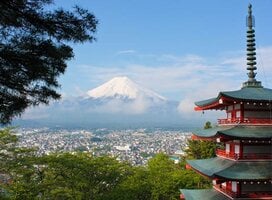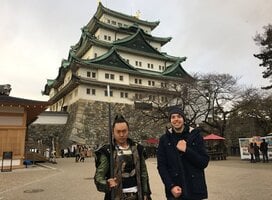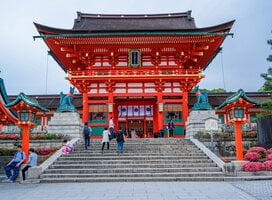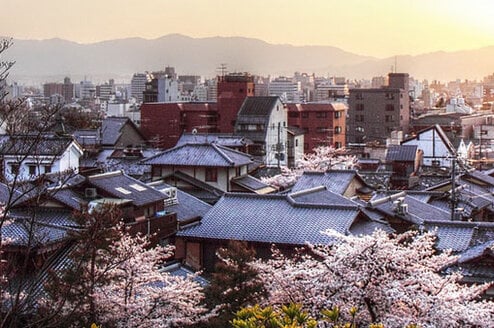Teach English in Tokyo, Japan
Most Westerners claim to know a great deal about Japan and Tokyo, its vibrant capital city, from various popular culture references. From Godzilla to the Harajuku District’s outrageous fashions, which have inspired Hollywood celebrities such as rocker Gwen Stefani, Tokyo’s popular culture is definitely familiar to the Western consciousness. Tokyo has also established a reputation as a city at the forefront of technology and innovation. Along with New York City and London, Tokyo is one of the top economic cities in the world.
As with anywhere else, do your research and use caution anywhere you go. Most English teachers chose to stay in Japan and even help out with relief efforts. They testify to the incredible spirit of the Japanese to come together after such a disaster. If you are concerned, visit your embassy websites for the latest information. Americans can also register for the Smart Traveler Enrollment Program.
In recent years, Japanese schools now require schoolchildren to learn English in school. Additionally, due to Tokyo’s position as one of the top business cities in the world, many companies want their employees to speak and understand English. As a result, there are plenty of opportunities for native English teachers, especially in teaching children and teaching business English to adults. The application process can be competitive, so if you see an opportunity you like and you are ready for the experience, go for it!
Government Sponsored Programs:
The JET Programme is the most popular and publicized government-sponsored program in Japan. It’s a huge initiative by several authorities of the Japanese government, including the Ministry of Foreign Affairs, to promote globalization and international relationships between Japan and other countries. You can work as an ALT (Assistant Language Teacher), Sports Exchange Advisor (SEA), or Coordinator for International Relations (CIR).
The JET Programme welcomes candidates from 40 different countries. They typically start recruiting in September, depending on your country, and offer year-round contracts. Interested applicants should apply through the Japanese Embassy or Consulate in their home countries.
The program does place teachers and other candidates in positions all around Japan, and Tokyo is a hotspot. These positions often require at least a Bachelor’s degree, and they prefer teaching certification and experience if you are interested in an ALT position. These positions are competitive and the application process takes a long time, do your research and be prepared to ace the interview!
Private Language Academies/Schools:
The JET Programme is certainly not the only way to teach English in Tokyo. Just like in Korea and Taiwan, there are private after-hours cram schools (called eikaiwa) located throughout Tokyo. You could be teaching children who come after their regular school, or adults who attend classes either in the mornings or in the evenings after work. These schools tend to hire year-round. Some of them offer housing for their teachers; others may provide a housing allowance. Some may provide airfare, while others may not. Also similar to Korea and Taiwan, there are large cram school chains in Tokyo, such as AEON and Gaba.
Public Schools:
The public school system has an application process of about four to six months, and recruits native English teachers around the springtime and in August. Working hours are usually 8:30 a.m. until 4:30 or 5:00 p.m. You get vacation time that the regular teachers receive, and you work alongside a Japanese co-teacher. Interested public school teachers, also called ALTs, can go through recruiting groups.
International Schools:
Tokyo is a thriving international city and as such, there are definitely international schools that can be an attractive option for a Western teacher. Hours are what you would expect from a regular school in your home country, as well as job expectations, such as grading papers and developing lesson plans. Students at international schools can be from various countries. International schools do ask their teachers to have teaching credentials from their home countries and appropriate experience. There is the American School in Japan, established in 1902.
Private Lessons:
English teachers can make anywhere from $20 to $45 USD per hour teaching private students. However, exercise caution: most contracts with schools will not allow private tutoring, as it could be viewed as competition and distraction from your duties. Also, it is not allowed for English teachers to tutor students from their school. If you want to accept private students, do it discreetly.
When and Where to Look for Jobs:
Jobs are offered year-round at most private language schools, especially in the big chains. The public schools hire around March - April and in August, near the beginning of new semesters. While it may be easier to find work when you’re already in Japan, it may be easiest to take care of your visa beforehand. Gather your documents and find the sponsorship of your employer before you leave your home country.
Qualifications:
For visa purposes, English teachers should have at least a Bachelor’s degree. Many schools prefer candidates with a 4-year degree. Other qualifications vary from school to school; some prefer TEFL/TESOL certification, and some want formal teacher certification from the home country. If you are teaching in a university, they would like a Master’s degree.
Salary & Cost of Living:
In 2012, Tokyo was named the most expensive city for expats to live in, according to The Economist and Mercer Intelligence Units. However, it is certainly possible for an English teacher to find reasonably-priced accommodations. Keep in mind that some schools will offer their teachers accommodations, usually shared kitchens and bathrooms and separate bedrooms. Tokyo is a densely-populated city, so apartments are smaller than what Westerners are used to.
An English teacher could end paying anywhere from $500 to $2000 USD per month for an apartment rental, depending on the neighborhood, size, amenities, etc. Most expats tend to live in one of the following four wards of Tokyo. Minato is a high-end neighborhood, close to much of Tokyo’s nightlife. Akasaka is where the U.S. Embassy is located. The Meguro District is the most affordable. While the Shibuya District is home to the insane, iconic Shibuya Crossing that appears in many movies, Shibuya’s neighborhoods are quieter and enjoyed by many expats. Check out Expat Arrivals for more information.
If you eat local food, your meals will be more affordable. It is possible to eat in Tokyo under a budget of $15 USD a day, especially if you shop in some of the Japanese grocery stores and look at the small local restaurants. Though, if you want a high-quality and expensive meal, Japanese or Western, Tokyo has you covered with numerous Michelin-starred restaurants.
Classroom & Work Culture:
- Student/Teacher Relations: Just like in Korea and Taiwan, there is the whole notion of “saving face” in Japan, which means the Japanese don’t typically participate in direct confrontations. Japanese students also prefer to say “Yes, I understand,” even when they don’t understand something, and they are uncomfortable with being singled out as better or inferior than the rest of the class. There is pride in group mentality over individualism. Japanese students do respect their teachers; however, they do not expect their Western teachers to know everything. They really want the experience of real, relaxed conversation with their Western teachers. They do, however, expect you to be pleasant and prepared in your lessons. Japanese students and teachers are also very modest in their dress.
- Dress Code: Despite some of the crazy fashions modeled in the Harajuku district and what you may watch in anime, the Japanese are actually very conservative when it comes to dress code at work. Follow the example of your coworkers, and wear business casual, unless otherwise specified. If you have tattoos, make sure they are covered, even in public bathing houses and spas.
- Greetings: The bow is the most common greeting known to Westerners, but there are varying degrees even within this significant cultural greeting. Most Japanese do not expect Western teachers to know everything about their etiquette, and they will help you. Remember that the deeper the bow, the more respect you are giving someone. It’s important to remember to remove your shoes before stepping on tatami mats; always wear socks, and sometimes bare feet is acceptable. If you’re at a social function, try not to leave before the guest of honor, and workers generally apologize if they leave work early.
Teaching Programs in Tokyo
What People Are Saying
New Teaching Jobs
View the latest teaching job postings on our job board.
Related Teach Abroad Articles
Frequently Asked Questions
-
Do I need to know Japanese to teach English in Japan?
You don't need to be fluent or know how to speak Japanese to teach English in Japan. In fact, many of the teaching programs offer free Japanese lessons for teachers.
Related Content -
How long can you teach English in Japan?
The length of time you are able to teach in Japan will depend on the visa you receive. Work visas in Japan can be for lengths between 4 months to 5 years and can be extended.
Related Content -
What are the requirements for teaching English in Japan?
Requirements will depend on the school you are hoping to work with, but most programs will require a Bachelor's degree and a clean criminal record. Some may also require a TEFL certification.
Related Content -
Can I teach in Japan without a degree?
Most schools in Japan will require teachers to have a Bachelor's degree, and some may also require TEFL certification.
Related Content -
Are English teachers in demand in Japan?
English teachers are in high demand in Japan, especially native speakers or speakers with native-level fluency.
Related Content -
What is the average salary for teaching English in Japan?
As an English teacher in Japan, you can expect to earn anywhere between $1,700-$5,000 per month, depending on the type of school you're in.
Related Content -
How do I start teaching English in Japan?
When considering teaching English in Japan, you'll want to consider where you want to be located, what type of school you want to teach in, and what age group you're hoping to work with. You can then begin applying to jobs through job boards, recruitment organizations, or by directly applying to specific schools. Start by checking out the Go Overseas Job Board!
Related Content

















